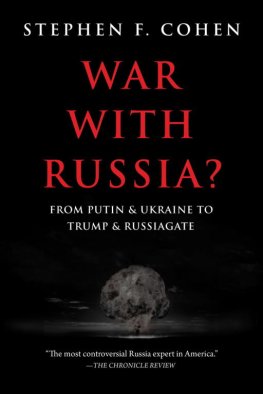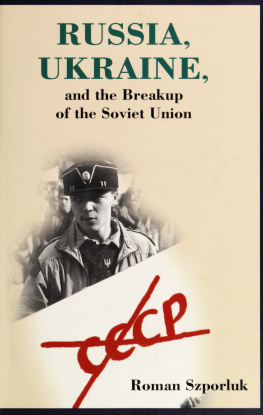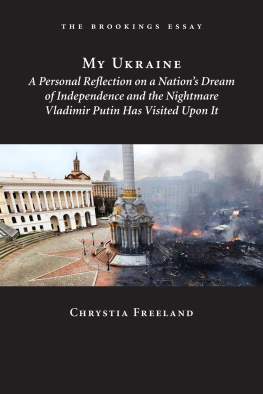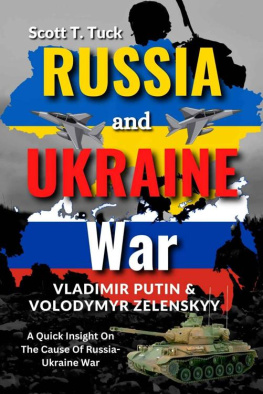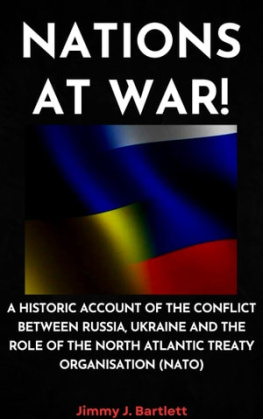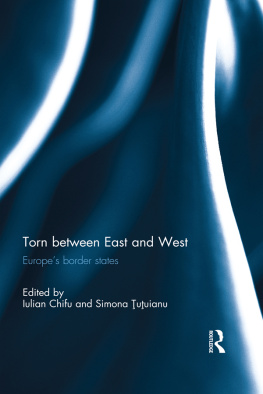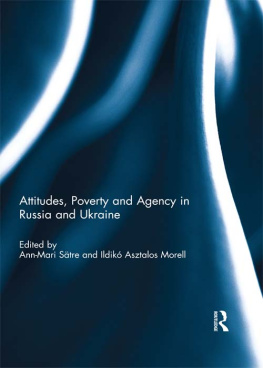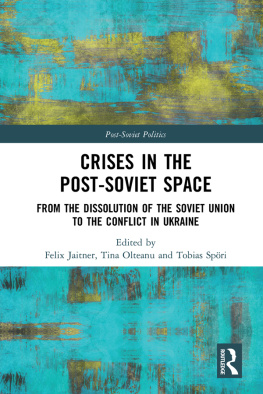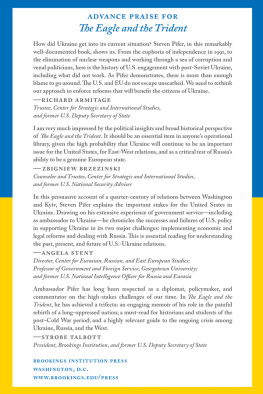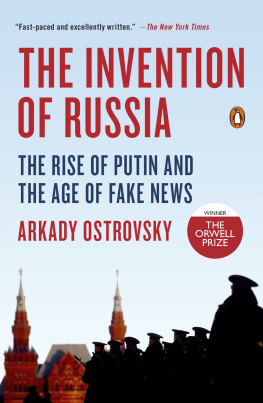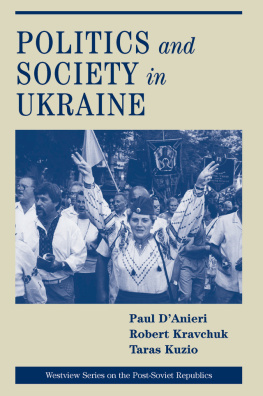With its eminent scholars and world-renowned library and archives, the Hoover Institution seeks to improve the human condition by advancing ideas that promote economic opportunity and prosperity, while securing and safeguarding peace for America and all mankind. The views expressed in its publications are entirely those of the authors and do not necessarily reflect the views of the staff, officers, or Board of Overseers of the Hoover Institution.
hoover.org
Hoover Institution Press Publication No. 446
Hoover Institution at Leland Stanford Junior University, Stanford, California 94305-6003
Copyright 2000 by the Board of Trustees of the Leland Stanford Junior University
All rights reserved. No part of this publication may be reproduced, stored in a retrieval system, or transmitted in any form or by any means, electronic, mechanical, photocopying, recording, or otherwise, without written permission of the publisher and copyright holder.
For permission to reuse material from Russia, Ukraine, and the Breakup of the Soviet Union, ISBN 978-0-8179-9542-3, please access copyright.com or contact the Copyright Clearance Center, Inc. (CCC), 222 Rosewood Drive, Danvers, MA 01923, 978-750-8400. CCC is a not-for-profit organization that provides licenses and registration for a variety of uses.
First printing 2000
26 25 24 23 22 21 20 10 9 8 7 6 5 4
Manufactured in the United States of America
The paper used in this publication meets the minimum requirements of the American National Standard for Information SciencesPermanence of Paper for Printed Library Materials, ANSI/NISO Z39.481992.
Front cover photo and frontispiece: 1990 Victor Maruschenko. Used with permission.
Library of Congress Cataloging-in-Publication Data
Szporluk, Roman.
Russia, Ukraine, and the breakup of the Soviet Union / Roman Szporluk
p. cm. (Hoover Institution Press publication ; 446)
Includes bibliographical references and index.
ISBN 978-0-8179-9542-3 (pbk.: alk. paper)
ISBN 978-0-8179-9543-0 (epub)
ISBN 978-0-8179-9547-8 (mobi)
ISBN 978-0-8179-9548-5 (PDF)
1. Russia (Federation)RelationsUkraine. 2. UkraineRelationsRussia (Federation). 3. NationalismRussia (Federation). 4. NationalismUkraine. 5. UkraineHistory19441991. 6. UkraineHistory1991. 7. Soviet UnionHistory19531985. 8. Soviet UnionHistory19851991. 9. Russia (Federation)History1991. I. Title: Russia, Ukraine, and the breakup of the Soviet Union. II. Title. III. Series: Hoover Institution Press publication ; 446.
DK67.5U38 S98 2000
99-050309
Foreword
The nationalities question in the former Soviet Union (FSU) bedeviled Soviet policymakers and continues to trouble post-Soviet authorities and scholars alike, even after the dissolution of the Soviet state. Russia, Ukraine, and other former Soviet republics remain multinational states, subject to interethnic tensions and secessionist tendencies. The recent situation in Chechnya shows that the FSU is still subject to fragmentation along national lines and underscores the urgent need to understand these incendiary issues.
Roman Szporluk, a well-known authority on Eastern Europe, Russia, and Ukraine, has grappled for years with the questions of Sovietization, Russification, and the rise of nationalism in the Soviet Union and the adjacent world. This volume, a selection of Professor Szporluks essays published between 1972 and 1997, tells a story crucial to understanding the dissolution of the Soviet Union and the emergence of its fifteen successor states. Szporluk examines the historical relationship of Ukraine and Russia and the parallel processes of nation building before and during the Soviet period. These nascent nationalisms not only affected Ukrainian-Russian relations but ultimately played a pivotal role in the disintegration of the Soviet Union. Most challenging to conventional interpretations of the Soviet empires demise, however, is Szporluks emphasis on the role played by Eastern Europe and the Soviet West (Western Ukraine, Western Belarus, and the Baltics).
In order to understand the national question in the Soviet Union, one must recur to the tsarist era and imperial Russias relations with both its minority populations and its colonial territories. According to Szporluk, precisely tsaristand later, SovietRussias successful imperial expansion undermined Russias own attempts at nation building. The tsarist regime remained purblind to the difficulties of incorporating territories and peoples that were alien to Russian cultural traditions, and the Soviet regime inherited its obtuseness. Moreover, the Soviet regime, blinkered by internationalist ideology, never came to grips with the nationalities question that their successful territorial acquisitions posed. In fact, the new Bolshevik regimes division of the Soviet state into administrative units based on ethnicity (and with the constitutional right to secede!) was a time bomb implanted in the foundation of the Soviet state. As Szporluk observes, however, it was the Soviet Unions greatest triumph of legitimationits World War II victorythat instigated its gradual decline. The postwar regime, like its predecessors, was ill-equipped to successfully integrate the newly annexed territories of West Ukraine, West Belarus, and the Baltics. Subsequently, these areas would become hotbeds of national dissent, susceptible to ideological contagion by their East European neighbors.
Szporluk addresses the challenges posed to Soviet ideological integrity by its incorporation of these western territories. Communist Party ideology held that the adoption of the Soviet system (Soviet vs. Western-style modernization) by national republics was the road to modernity and prosperity. Szporluk sees a dialectical relationship established between Russianness and communism in Stalins Russification policy: The success of Russification would impel the success of the Soviet project, and successful economic and social modernization (Sovietization) would foster Russification.
The inclusion of the Baltics and West Ukraine in the Soviet Union in the wake of World War II, and the incorporation of Eastern Europe under the Warsaw Pact umbrella, allowed Soviet citizens to experience the disjuncture between ideological claims and reality. The legitimacy and stability of the Soviet Union required complete isolation, not only from the capitalist West, but from more advanced Eastern European nations that would provide Soviet citizens with a basis of comparison on which to judge the merits of their own system. In short order, the Baltics were acknowledged as Russias own abroad, and Balts evinced the greatest resistance to Sovietization and concomitant Russification. The Baltic republics strategically refrained from questioning the superiority of Soviet communism to capitalism and instead championed the preservation of their national distinctiveness. However, the implicit assertion that the road to modernity may be attained through nation building, rather than Soviet internationalism, paved the way for the emergence of explicit nationalisms and nationalist critiques of the Soviet system in Russia as well as in the other union republics.





